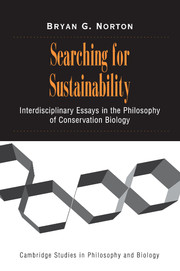Book contents
- Frontmatter
- Contents
- Searching for Sustainability
- General Introduction: An Interdisciplinary Experiment
- I PRAGMATISM AS AN ENVIRONMENTAL PHILOSOPHY
- II SCIENCE, POLICY, AND POLICY SCIENCE
- III ECONOMICS AND ENVIRONMENTAL SUSTAINABILITY
- IV SCALING SUSTAINABILITY: ECOLOGY AS IF HUMANS MATTERED
- 15 Context and Hierarchy in Aldo Leopold's Theory of Environmental Management
- 16 Scale and Biodiversity Policy: A Hierarchical Approach, with Robert E. Ulanowicz
- 17 Ecological Integrity and Social Values: At What Scale?
- 18 Change, Constancy, and Creativity: The New Ecology and Some Old Problems
- 19 Democracy and Sense of Place Values in Environmental Policy, with Bruce Hannon
- V SOME ELEMENTS OF A PHILOSOPHY OF SUSTAINABLE LIVING
- VI VALUING SUSTAINABILITY: TOWARD A MORE COMPREHENSIVE APPROACH TO ENVIRONMENTAL EVALUATION
- Index
- References
17 - Ecological Integrity and Social Values: At What Scale?
Published online by Cambridge University Press: 21 January 2010
- Frontmatter
- Contents
- Searching for Sustainability
- General Introduction: An Interdisciplinary Experiment
- I PRAGMATISM AS AN ENVIRONMENTAL PHILOSOPHY
- II SCIENCE, POLICY, AND POLICY SCIENCE
- III ECONOMICS AND ENVIRONMENTAL SUSTAINABILITY
- IV SCALING SUSTAINABILITY: ECOLOGY AS IF HUMANS MATTERED
- 15 Context and Hierarchy in Aldo Leopold's Theory of Environmental Management
- 16 Scale and Biodiversity Policy: A Hierarchical Approach, with Robert E. Ulanowicz
- 17 Ecological Integrity and Social Values: At What Scale?
- 18 Change, Constancy, and Creativity: The New Ecology and Some Old Problems
- 19 Democracy and Sense of Place Values in Environmental Policy, with Bruce Hannon
- V SOME ELEMENTS OF A PHILOSOPHY OF SUSTAINABLE LIVING
- VI VALUING SUSTAINABILITY: TOWARD A MORE COMPREHENSIVE APPROACH TO ENVIRONMENTAL EVALUATION
- Index
- References
Summary
INTRODUCTION: THE SEARCH FOR A TRANSDISCIPLINARY SCIENCE OF SUSTAINABILITY
A number of recent writers and speakers have asserted, and I strongly agree with them, that ecosystem health and ecosystem integrity require normative definitions (Norton 1988; Norton 1991a; Callicott 1992; Rapport 1992). Since it is not questioned that these terms must also have descriptive content, it is fair to say that they are both normative and descriptive and that they form the central terms of an emerging science of ecologically sensitive environmental management. It is, therefore, imperative that these definitions be clear and operational; but it is also necessary that the terms reflect, in some important way, human and social values. The purpose of this paper is to explore what it really and practically means to propose a science capable of both describing and evaluating changes in the physical and biotic systems that form the human environment. In the process, I illustrate how social values might be integrated into a science of management by outlining a scalar approach to valuing and describing changes in states of ecological systems.
Providing definitions for the key terms, ecological health and ecological integrity, is far more complicated than providing dictionary-type definitions because these concepts must be embedded in a new, more comprehensive conceptual framework – what is sometimes called a new paradigm. (In this paper I will discuss integrity mainly, but many points made here about the logic of descriptive-normative concepts apply as well to ecosystem health.
- Type
- Chapter
- Information
- Searching for SustainabilityInterdisciplinary Essays in the Philosophy of Conservation Biology, pp. 305 - 327Publisher: Cambridge University PressPrint publication year: 2002

